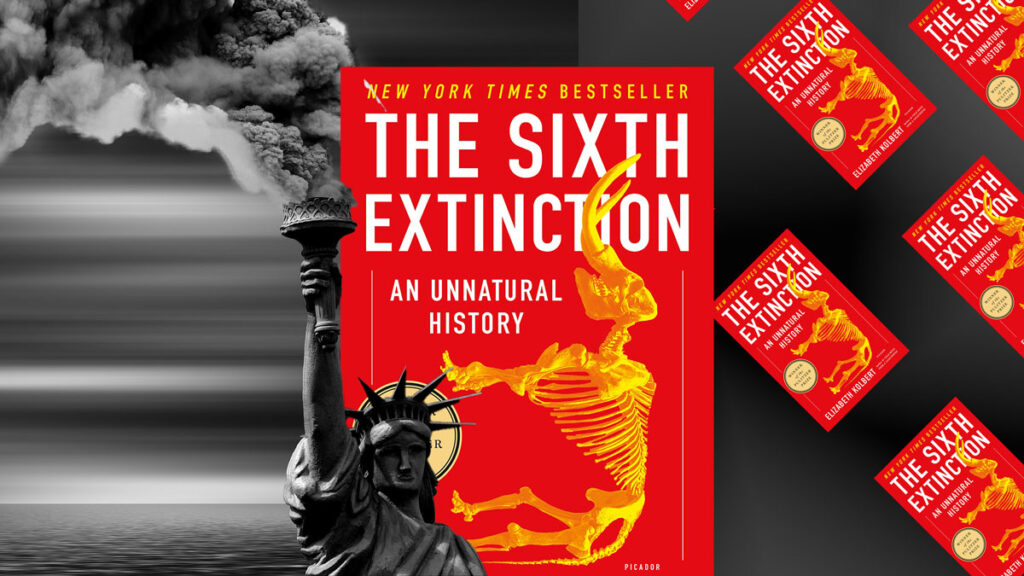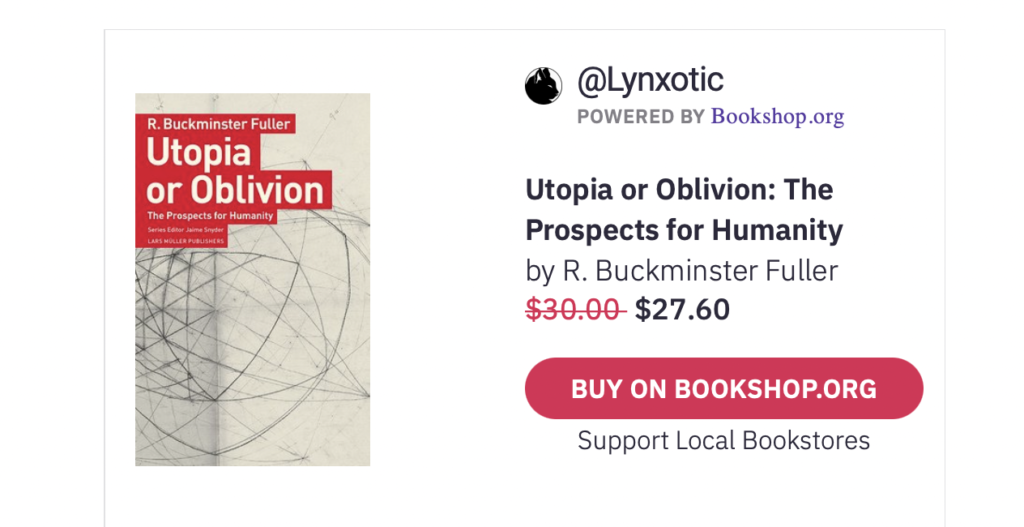Books
Climate Change Books: Why 04-22-22 will mark the Beginning of a New Era in Human History
Published
2 years agoon

For 50 years warnings have been ignored: now it will be actions and solutions that matter
As a child I was fascinated with the Geodesic Dome and other inventions, such as the Dymaxion Car by R. Buckminster Fuller. I devoured his books but one stood out in particular. ‘Utopia or Oblivion‘, an obscure title that was difficult to read due to the pregnant prose and the seemingly overwrought message ( and title), the text shocked my young mind.
Originally published in 1963, decades before my birth, is is now nearly 60 years since it came out. What was shocking to me, at the time I first read it, was that the warnings in the book, made abundantly and overtly clear in the title and body, were not heeded, and that basically after decades passed the issue of fossil fuels being a non-sustainable resource was virtually ignored, with prejudice.
In 1963 the ozone layer was for all practical purposes still intact. Climate change, and / or global warming, caused by massive carbon emissions and the whole nasty, familiar story of today, was not even a consideration.
It was enough to know, unequivocally, that oil and other fossil fuels were a finite resource, and therefore will one day run out, that made it imperative, according to Fuller, to begin the necessary journey to building a world without them.
A book written by a genius, scientist, innovator and sage
This book ‘did the math’ and the science and concluded that humankind (still called mankind in those days) would have two fates possible in the next century (our century, f.y.i.): Utopia or Oblivion. To understand why this is absolutely right, in my opinion, I recommend reading the 448 pages of the book, 8 times, as I have.
In the many years since I first read this, now 59 year old book, the only thing that has changed is that his predictions of a world where humanity would face extinction (or be rescued by the realization that utopia is possible once we, as a species, make it possible) are now more definitely certain than ever.
Elon Musk, someone who would likely agree with much of the science in the book, is trying to get the “light of human consciousness‘ to Mars, since Earth’s survival hangs in the balance.
In the years since the documentary “An Inconvenient Truth” (2006) was released, scores of scientists and world leaders have repeatedly warned of the increasing dangers, with actual occurrences and measurements producing evidence, mountains of evidence month by month. It has reached a point where, even in the USA which has the highest percentage of climate change skeptics, over 70% of the population, nevertheless, believes the threat is serious, important, and real.

Finally, nearly 60 years after R. Buckminster Fuller’s seminal work, there is a consensus in the world that this is a problem that must be solved.
Not something to debate or consider. Nothing to prove or produce evidence of in order to justify acting on, we all believe (as a majority) that the solutions must be found and the actions needed to implement those chances must be started immediately.
Some of us, for example anyone who read ‘Utopia or Oblivion’ during the last 59 years, or anyone who ‘did the math’ and understood that oil and fossil fuels are not, and never were, meant to be a permeant source of energy for humanity, are ready to act.
Therefore, this article, and many more you will have the opportunity to read in celebration of Earth Day 2022, is designed to invite you to act now, if only by reading and learning about the challenges we face.
And then, armed with knowledge and understanding, to begin today, on 04-22-2022, the first day of a new era in human history, the beginning of transition to the sustainable, clean energy era. Utopia, then must be achieved, in order to prevent Oblivion.
The Sixth Extinction: An Unnatural History

WINNER OF THE PULITZER PRIZE
ONE OF THE NEW YORK TIMES BOOK REVIEW‘S 10 BEST BOOKS OF THE YEAR
A NEW YORK TIMES BESTSELLER
A NATIONAL BOOK CRITICS CIRCLE AWARD FINALISTA major book about the future of the world, blending intellectual and natural history and field reporting into a powerful account of the mass extinction unfolding before our eyes Over the last half-billion years, there have been Five mass extinctions, when the diversity of life on earth suddenly and dramatically contracted. Scientists around the world are currently monitoring the sixth extinction, predicted to be the most devastating extinction event since the asteroid impact that wiped out the dinosaurs. This time around, the cataclysm is us. In prose that is at once frank, entertaining, and deeply informed, New Yorker writer Elizabeth Kolbert tells us why and how human beings have altered life on the planet in a way no species has before. Interweaving research in half a dozen disciplines, descriptions of the fascinating species that have already been lost, and the history of extinction as a concept, Kolbert provides a moving and comprehensive account of the disappearances occurring before our very eyes. She shows that the sixth extinction is likely to be mankind’s most lasting legacy, compelling us to rethink the fundamental question of what it means to be human.
How to Avoid a Climate Disaster

#1 NEW YORK TIMES BEST SELLER – In this urgent, authoritative book, Bill Gates sets out a wide-ranging, practical–and accessible–plan for how the world can get to zero greenhouse gas emissions in time to avoid a climate catastrophe.Bill Gates has spent a decade investigating the causes and effects of climate change. With the help of experts in the fields of physics, chemistry, biology, engineering, political science, and finance, he has focused on what must be done in order to stop the planet’s slide to certain environmental disaster. In this book, he not only explains why we need to work toward net-zero emissions of greenhouse gases, but also details what we need to do to achieve this profoundly important goal. He gives us a clear-eyed description of the challenges we face. Drawing on his understanding of innovation and what it takes to get new ideas into the market, he describes the areas in which technology is already helping to reduce emissions, where and how the current technology can be made to function more effectively, where breakthrough technologies are needed, and who is working on these essential innovations.
Finally, he lays out a concrete, practical plan for achieving the goal of zero emissions–suggesting not only policies that governments should adopt, but what we as individuals can do to keep our government, our employers, and ourselves accountable in this crucial enterprise.
As Bill Gates makes clear, achieving zero emissions will not be simple or easy to do, but if we follow the plan he sets out here, it is a goal firmly within our reach.
The Great Derangement: Climate Change and the Unthinkable

Are we deranged? The acclaimed Indian novelist Amitav Ghosh argues that future generations may well think so. How else to explain our imaginative failure in the face of global warming? In his first major book of nonfiction since In an Antique Land, Ghosh examines our inability–at the level of literature, history, and politics–to grasp the scale and violence of climate change.
The extreme nature of today’s climate events, Ghosh asserts, make them peculiarly resistant to contemporary modes of thinking and imagining. This is particularly true of serious literary fiction: hundred-year storms and freakish tornadoes simply feel too improbable for the novel; they are automatically consigned to other genres.
In the writing of history, too, the climate crisis has sometimes led to gross simplifications; Ghosh shows that the history of the carbon economy is a tangled global story with many contradictory and counterintuitive elements. Ghosh ends by suggesting that politics, much like literature, has become a matter of personal moral reckoning rather than an arena of collective action. But to limit fiction and politics to individual moral adventure comes at a great cost. The climate crisis asks us to imagine other forms of human existence–a task to which fiction, Ghosh argues, is the best suited of all cultural forms. His book serves as a great writer’s summons to confront the most urgent task of our time.
No Planet B: A Teen Vogue Guide to the Climate Crisis

An urgent call for climate justice from Teen Vogue, one of this generation’s leading voices, using an intersectional lens – with critical feminist, indigenous, antiracist and internationalist perspectives. As the political classes watch our world burn, a new movement of young people is rising to meet the challenge of climate catastrophe. This book is a guide, a toolkit, a warning and a cause for hope.
I hope that this book embodies Teen Vogue’s motto of making young people feel seen and heard all over the world. I hope that it forces their parents, communities, loved ones, friends, and–most importantly–those in power to see that the health of our planet depends on how quickly and drastically we change our behaviors. I hope it forces them all to respond. –From the foreword by Teen Vogue editor-in-chief, Lindsay Peoples Wagner
The Uninhabitable Earth: Life After Warming

#1 NEW YORK TIMES BESTSELLER – “The Uninhabitable Earth hits you like a comet, with an overflow of insanely lyrical prose about our pending Armageddon.”–Andrew Solomon, author of The Noonday Demon
With a new afterwordIt is worse, much worse, than you think. If your anxiety about global warming is dominated by fears of sea-level rise, you are barely scratching the surface of what terrors are possible–food shortages, refugee emergencies, climate wars and economic devastation. An “epoch-defining book” (TheGuardian) and “this generation’s Silent Spring” (The Washington Post), The Uninhabitable Earth is both a travelogue of the near future and a meditation on how that future will look to those living through it–the ways that warming promises to transform global politics, the meaning of technology and nature in the modern world, the sustainability of capitalism and the trajectory of human progress. The Uninhabitable Earth is also an impassioned call to action. For just as the world was brought to the brink of catastrophe within the span of a lifetime, the responsibility to avoid it now belongs to a single generation–today’s. Praise for The Uninhabitable Earth“The Uninhabitable Earth is the most terrifying book I have ever read. Its subject is climate change, and its method is scientific, but its mode is Old Testament. The book is a meticulously documented, white-knuckled tour through the cascading catastrophes that will soon engulf our warming planet.”–Farhad Manjoo, The New York Times
Related Articles:
- The Earthly Frontier: Building a Sustainable Future at Home
- Beating the Heatwaves: a Sensual Solution to Satisfy your Limbic System
- For 150 Years Oil was Everything – Our Life, Our Economy: Now It’s Time to Imagine a New Way
- This Climate Solution is a Sleeping Giant
- Microgrids and Distributed Solar Energy can Change our Future
Find books on Music, Movies & Entertainment and many other topics at Bookshop.org
Lynxotic may receive a small commission based on any purchases made by following links from this page



